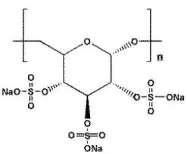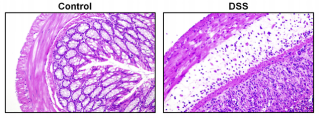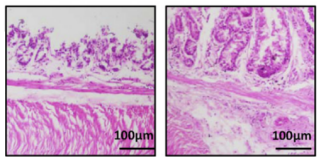Dextran Sulfate Sodium Salt (DSS) MW:36000~50000
Description
Dextran sulfate sodium salt (DSS) is a polyanionic derivative of dextran produced by the esterification of Dextran with chlorosulphonic acid. The sulfur content is approximately 17% which corresponds to an average of 1.9 sulfate groups per glucosyl residue of the dextran molecule. DSS has several characteristics: 1) polyanionic complex, soluble in water, forming a colorless aqueous solution; 2) high purity and good stability; 3) can be degraded naturally. Inflammatory bowel disease (IBD) is a chronic, relapsing gastrointestinal infection that increases the risk of intestinal tumors, mainly including UC and Crohn disease (CD). In 1985, after the hamster ulcerative colitis model was first prepared by using DSS, a large number of studies have proved that the DSS colitis model is similar to human ulcerative colitis. The histological features, clinical manifestations, disease site, and cytokine proliferation of the DSS colitis model are very similar to human ulcerative colitis (UC). The modeling conditions and operation methods of this model are simple, the expenditure is very cheap, the repeatability is good, and it is easy to master and popularize. The DSS concentration and dosing time can be adjusted according to the experimental purpose to establish acute, chronic, and acute-chronic alternation models.
Features
- The protocols are easy to be implemented.
- The DSS UC model closely resembles human UC symptoms with high repeatability.
- Various characteristic symptoms can be induced by controlling the administrated DSS dose, which was unique for the DSS UC model.
- The DSS UC model can be generated with a variety of widely used model animals, such as mice, rats, zebrafish, pigs, fruit flies, etc.
- The IBD-induced colitis-associated cancer (CAC) model can be created with the combined use of azoxymethane (AOM).
Applications
- For modeling colitis
Specifications
| English synonym | Dextran Sulfate Sodium Salt, DSS; Dextran Sodium Sulfate |
| CAS NO. | 9011-18-1 |
| Formula | (C6H7Na3O14S3)n |
| Appearance | White or off-white powder |
| Solubility | Soluble in water, slightly soluble in ethanol. |
| Structure |  |
Components
| Components No. | Name | 60316ES25 | 60316ES60 | 60316ES76 | 60316ES80 |
| 60316 | Dextran Sulfate Sodium Salt (DSS) MW:36000~50000 | 25 g | 100 g | 500 g | 1 kg |
Shipping and Storage
The product is shipped and stored at room temperature, valid for 2 years.
Figure

Figure 1 H&E staining results of DSS acute colitis sections[1]
Animal: BALB/c mice, female, 6-8 weeks, 25 g; Method: 3.5% DSS for 7 days

Figure 2 H&E staining results of colitis-associated cancer sections[2]
Animal: BALB/c mice, male,7 weeks old;; DSS concentration: 2.5%; AOM concentration:10 mg/kg; Experiment period:10 weeks
*Links to this resource:
[1]Gao X, Fan W, Tan L, et al. Soy isoflavones ameliorate experimental colitis by targeting ERα/NLRP3 inflammasome pathways[J]. The Journal of Nutritional Biochemistry, 2020, 83.
[2]Jia-Rong Huang, et al. Piperlongumine Alleviates Mouse Colitis and Colitis-Associated Colorectal Cancer[J]. Frontiers in Pharmacology. 2020.586885
Q1: What are the key factors that affect the success of DSS modeling?
A1: DSS concentration, molecular weight, administration time, animal species and rearing environment.
Q2: What is the daily volume of drinking water for rats and mice (including acute and chronic modeling)?
A2: 7-10 mL per day for mice (20~25 g) and 10~11 mL per day for rats (100 g).
Q3: Both DSS and TNBS are models of colitis. What is the difference between the two?
A3: DSS induces ulcerative colitis and TNBS induces Crohn's colitis.
Q4: What is the difference between GAPDH and actin for primer selection?
A4: The difference is not big. GAPDH is used more. It is recommended to use GAPDH as an internal reference for mice.
Q5: Mice have a high lethality rate
A5: Reason: DSS concentration is too high. Recommendation: Appropriately reduce the concentration of DSS administered
Q6: Mice have no symptoms of enteritis or low symptoms of enteritis
A6: Reason: DSS concentration is too low, suggestion: appropriately increase DSS administration concentration; or reduce cycle interval (10-14 days)
Q7: In the same group of mice, the symptoms of enteritis vary greatly
A7: Reasons: 1. The bottle cap was blocked; 2. Some mice did not drink/a small amount of DSS. Suggestions: 1. Check the mouse drinking bottle every day; 2. Each mouse is isolated and cultured separately, and the water intake of the mice is checked every day or the mice are pre-raised for 1-2 weeks after arrival, and the mice with abnormal water intake are excluded.
Q8: Which part of the colon is more reliable for HE staining?
A8: The mouse anus goes up 1-2 cm.
Q9: DSS treatment of NCM460, the recommended concentration for cell modeling
A9: It is recommended to incubate with 3% DSS for 24h.
2022
[1] Lujuan Xing, Lijuan Fu, Songmin Cao,et al.The Anti-Inflammatory Effect of Bovine Bone-Gelatin-Derived Peptides in LPS-Induced RAW264.7 Macrophages Cells and Dextran Sulfate Sodium-Induced C57BL/6 Mice[J]. Nutrients 2022, 14, 1479. IF=5.717
[2] Lei-NingChen,TaoJing,Zi-BinLin,et al.Metabolomic and transcriptomic responses of mouse testis to the dextran sulfate sodium induced colitis[J].Reproductive Toxicology.2022, Pages 35-42.IF=3.143
[3] YuangengLi,PingYu,WenwenFu,et al.Polysaccharides from Panax ginseng C. A. Meyer alleviated DSS-induced IBD by inhibiting JAK2/STAT1/NLPR3 inflammasome signalling pathway in mice[J].Journal of Functional Foods.2022, 105013. IF=4.451
[4] Wang S, Huang J, Tan KS, et al.Isosteviol Sodium Ameliorates Dextran Sodium Sulfate-Induced Chronic Colitis through the Regulation of Metabolic Profiling, Macrophage Polarization, and NF-B Pathway[J].Oxidative Medicine and Cellular Longevity. 2022,4636618. IF=5.076
[5] Chenglu Sun, Jingpeng Hao,Hong Qin,et al.Endometrial Regenerative Cell-Derived Conditioned Medium Alleviates Experimental Colitis. * Cells Int 2022;2022 IF=3.869
2021
[1] Hao H, Zhang X, Tong L, Liu Q,et al.Lactobacillus plantarumEffect of Extracellular Vesicles Derived From Q7 on Gut Microbiota and Ulcerative Colitis in Mice[J].Frontiers in Immunology.2021.777147.IF=7.561
[2] Lingjun Tong, Xinyi Zhang , Haining Hao,et al.Lactobacillus rhamnosus GG Derived Extracellular Vesicles Modulate Gut Microbiota and Attenuate Inflammatory in DSS-Induced Colitis Mice[J].Nutrients.2021, 13, 3319. IF=5.717
[3] Zhipeng Gu , Yujie Zhu, Fengfeng Mei,et al.Tilapia head glycolipids protect mice against dextran sulfate sodium-induced colitis by ameliorating the gut barrier and suppressing NF-kappa B signaling pathway[J].International Immunopharmacology.96 (2021) 107802. IF=3.943
[4] JialiDong,YuanLi,HuiwenXiao,et al.Oral microbiota affects the efficacy and prognosis of radiotherapy for colorectal cancer in mouse models[J].Cell reports.2021, 109886.IF=9.423
[5] Yaohua Fan,Yanqun Fan,Kunfeng Liu,et al.Edible Bird’s Nest Ameliorates Dextran Sulfate Sodium-Induced Ulcerative Colitis in C57BL/6J Mice by Restoring the Th17/Treg Cell Balance[J].Frontiers in Pharmacology.2021.632602.IF=7.561
2020
[1] Jia-Rong Huang, Sheng-Te Wang, Meng-Ning Wei,et al.Piperlongumine Alleviates Mouse Colitis and Colitis-Associated Colorectal Cancer[J].Frontiers in Pharmacology.2020.586885. IF=7.561
[2] Gao X, Fan W, Tan L, et al. Soy isoflavones ameliorate experimental colitis by targeting ERα/NLRP3 inflammasome pathways[J]. The Journal of Nutritional Biochemistry, 2020, 83.IF=6.048
[3] Li, Y., Dong, J., Xiao, H., Zhang, S., Wang, B., Cui, M., & Fan, S. Gut commensal derived-valeric acid protects against radiation injuries. Gut Microbes,.2020 .1–18.IF=10.245
Before 2020
[1] Oehlers SH, Flores MV, Hall CJ, Crosier KE, Crosier PS. Retinoic acid suppresses intestinal mucus production and exacerbates experimental enterocolitis. Dis Model Mech. 2012 Jul;5(4):457-67.IF=4.973
[2] Kim CJ, Kovacs-Nolan JA, Yang C, Archbold T, Fan MZ, Mine Y. l-Tryptophan exhibits therapeutic function in a porcine model of dextran sodium sulfate (DSS)-induced colitis. J Nutr Biochem. 2010 Jun;21(6):468-75.IF=6.048
[3] Karpowicz , P., Perez, J. & Perrimon , N.,. The Hippo tumor suppressor pathway regulates intestinal cell regeneration. Development (Cambridge, England), 2010,137(24), pp.4135–4145.IF=6.868
[4] Fan H, Chen W, Zhu J, et al. Toosendanin alleviates dextran sulfate sodium-induced colitis by inhibiting M1 macrophage polarization and regulating NLRP3 inflflammasome and Nrf2/HO-1 signaling[J]. International immunopharmacology, 2019, 76: 105909.IF=3.943
Catalog No.:*
Name*
phone Number:*
Lot:*
Email*
Country:*
Company/Institute:*
Recommended products

